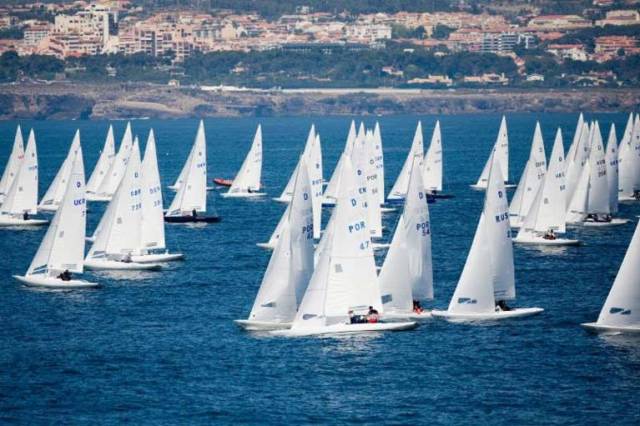Royal St. George's Martin Byrne makes a welcome return to the Dragon in the second leg of the 2019 European Cup and will be crewed by Brian Matthews and Mark Pettit, who both have multiple Dragon titles to their names. Winner of the 2011 Dragon Edinburgh Cup, for the British Open Championship, Martin is looking forward to his return to international competition and, as a sailor who loves big seas and big breezes, is sure to find Cascais in Portugal to his liking.
The 24th HM King Juan Carlos Regatta, to be hosted by the Clube Naval de Cascais from 1 to 4 May 2019, will see the leading International Dragon crews come together for the second leg of the four regatta 2019 Dragon European Cup series.
After a stunning opening event in Cannes in April, the fleet moves on to Portugal’s Atlantic Coast for what promises to be another hotly contested regatta. Cascais offers spectacular open ocean racing with big waves and strong breezes. The top players from the Cannes event have made the trip to Cascais and with crews from Portugal, Belgium, Spain, the Netherlands, Japan, Germany, Switzerland, Ireland, Russia, Monaco, the United Kingdom and the Royal Hong Kong Yacht Club all taking part it will truly be an international affair.
Portugal’s Pedro Rebelo de Andrade currently leads the series having taken victory in Cannes and goes into this regatta with home waters advantage. For Britain’s Grant Gordon Cascais is also familiar territory and having had to settle for third place in Cannes, following the abandonment of a race he was leading and a black flag in the penultimate race, he will be very much hoping to avoid incident and climb the rankings. Also hoping to move up the leader board are Switzerland’s Hugo Stenbeck and Russia’s Dmitry Samokhin, who finished fifth and sixth respectively in Cannes.
There are a number of new faces joining the fleet for this second leg including Britain’s Martin Payne, one of the fleet’s most experienced and successful sailors, who is teaming up with double and reigning Dragon World Champion Ali Tezdiker and top local sailor Antonio Matos. Martin has raced in Cascais for many years and knows the waters well, so this will certainly be a team to watch.
Fresh from a seventh place at the 2019 Dragon World Championship in Freemantle comes Charlotte ten Wolde from the Netherlands, who will race with her sister Juliette, Janka Holan and Francisco Rebelo de Andrade. Francisco represented Portugal at the 2008 Beijing and 2012 London Olympics in the 49er class and also counts Cascais as home waters, so this team has huge potential.
Eight windward-leeward races are scheduled over the four days with courses set in either Cascais Bay or the Guia race area, depending on weather conditions. Ashore the Clube Naval de Cascais will offer a welcoming home from home for the sailors with après sailing gatherings each evening and a final prize giving on Saturday.
The 2019 Dragon European Cup circuit comprises four regattas plus a Grand Final. The four regattas are the Dragon Grand Prix Cannes (2-5 April), the 24th HM King Juan Carlos Regatta, Cascais (1-4 May), the Dragon Grand Prix Germany, Kuhlungsborn (3-6 July) and the Dragon Grand Prix Spain, Palma de Mallorca (11-14 November). The Grand Final takes place in Palma on 15 and 16 November. To qualify for the Final, teams must compete in three of the four regattas including the Grand Prix Spain. Twenty teams will qualify for the final and there will be a quota for Non-Corinthian and Corinthian sailors based on the proportion of non-Corinthian/Corinthian teams participating in all four qualifying events.






























































